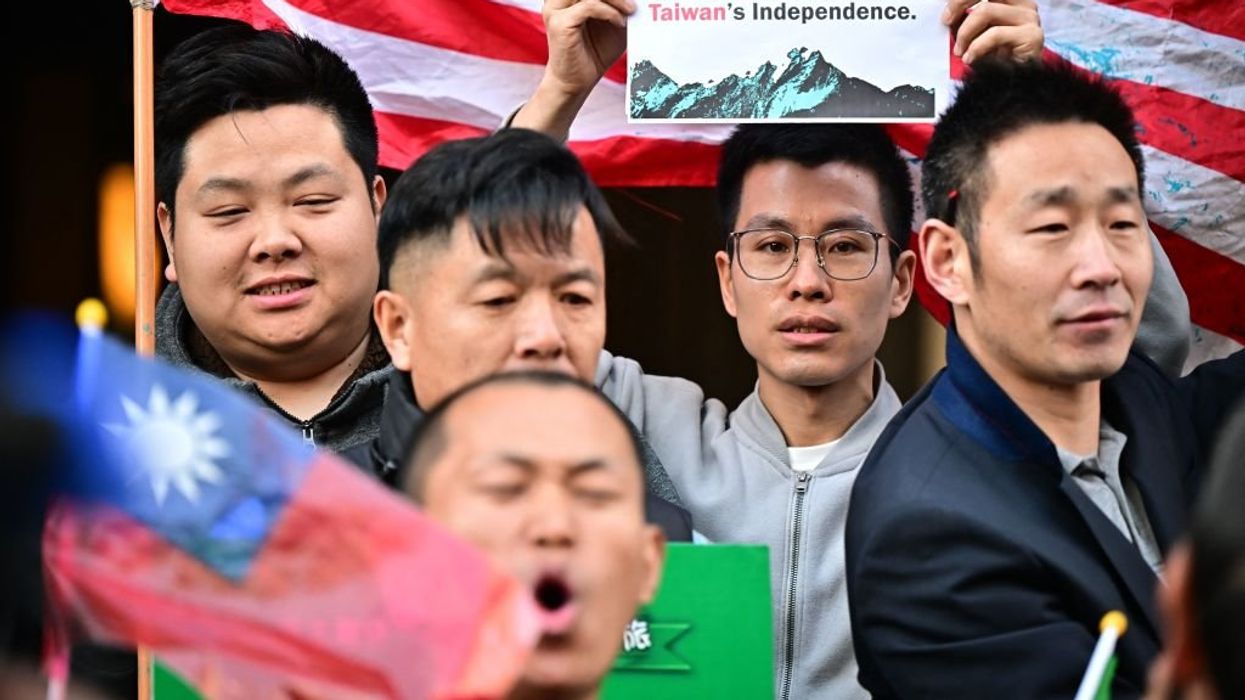
Photo by FREDERIC J. BROWN/AFP via Getty Images

Tsai, McCarthy, and a bipartisan group of U.S. lawmakers will convene at the Ronald Reagan Presidential Library in California's Simi Valley, reported CNN.
Former Republican speaker Newt Gingrich indicated that the meeting will serve as a "morale boost."
"I think it's a useful thing to communicate to a country — that’s under enormous pressure — that they have real allies," said Gingrich.
Bonny Lin, director of the China Power Project at the Center for Strategic and International Studies in Washington, told CNN, "For President Tsai, an in-person meeting with Speaker McCarthy would showcase U.S. bipartisan support for Taiwan."
Lin added, "Speaker McCarthy will likely use the meeting to demonstrate that the United States stands with Taiwan and is willing to push back against [China’s] attempts to pressure, coerce, and internationally isolate the island."
Tsai, who arrived in New York City last week, said Taiwan's relationship with the U.S. has "never been closer," despite America's reluctance to take an official position on Taiwan's sovereignty.
Democratic President Jimmy Carter ended America's diplomatic relationship with Taiwan in 1979 in order to satisfy and improve commercial relations with the communist regime in Beijing, which Washington then recognized as the sole legal government of all China. Following this decision, Congress passed the Taiwan Relations Act, enabling the U.S. to continue collaborating with the people of Taiwan, albeit without formal diplomatic ties or guarantees that the U.S. would intervene militarily if China invades.
Notwithstanding the two nations' informal partnership, the U.S. remains the primary arms provider to Taiwan and has made multibillion-dollar weapons deals with the island nation in recent years.
NPR noted that China has threatened "countermeasures" in response to the meeting, just as it did when Rep. Nancy Pelosi visited the island nation in August 2022.
TheBlaze previously reported that China extended its threatening military exercises around Taiwan after Pelosi's visit.
"If she has contact with U.S. House Speaker McCarthy, it will be another provocation that seriously violates the one-China principle, harms China’s sovereignty and territorial integrity, and destroys peace and stability in the Taiwan Strait," said Zhu Fenglian, spokesman for China's Taiwan Affairs Office. "We firmly oppose this and will definitely take measures to resolutely fight back."
Xu Xueyuan, a spokesman for the Chinese regime, claimed, "What the U.S. has done seriously undermines China’s sovereignty and territorial integrity," stressing that the U.S. should bear "all consequences."
Earlier this week, Li Xiang, a communist apparatchik who deals with congressional affairs at the Chinese embassy in Washington, stressed to members of Congress that Beijing opposed "any form of official interaction" between the U.S. and Taiwan, reported Newsweek.
"I have to point out that China will not sit idly by in the face of a blatant provocation and will most likely take necessary and resolute actions in response to the unwanted situation," Lin wrote, imploring members of McCarthy's entourage to cave.
Taiwan's Foreign Affairs Ministry called Beijing's threats "increasingly absurd," reported NBC News.
"Even if the authoritarian government continues to expand and increase coercion, Taiwan will not back down," said the ministry.
It appears as though Beijing may test Taipei's resolve.
The Guardian reported that Taiwan's defense ministry has spotted a Chinese aircraft carrier group passing off the island's southeast coast.
"The Chinese communists continue to send aircraft and ships to encroach in the seas and airspace around Taiwan," said the ministry. "In addition to posing a substantial threat to our national security, it also destroys the status quo of regional security and stability. Such actions are by no means the acts of a responsible modern country."
In responses to threats from Beijing, White House spokesman John Kirby underscored that Tsai's visits to the U.S. were "private" and "unofficial."
"The People’s Republic of China should not use this transit as a pretext to step up any aggressive activity around the Taiwan Strait. The United States and China have differences when it comes to Taiwan, but we have managed those differences for more than 40 years," said Kirby.
The White House has not endorsed McCarthy's meeting with the Taiwanese president.
While China is militarily threatening Taiwan once again, it is apparently also taking retaliatory action on American soil.
Newsweek indicated that Li Chunlin, a senior communist diplomat at China's consulate in Los Angeles, has been coordinating protests with the intention of disrupting the meeting. The deputy consul is allegedly paying Chinese agitators between $200 and $400 in hopes of mobilizing "more than 1,000 people."
The Chinese consulate in Los Angeles issued a statement saying that McCarthy "will undoubtedly repeat disastrous past mistakes and further damage Sino-U.S. relations. ... It will only strengthen the Chinese people’s strong will and determination to share the same enemy and support national reunification."
While it remains to be seen what Tsai and McCarthy discuss, Elbridge Colby, lead architect of the 2018 National Defense Strategy and former deputy assistant secretary of defense for strategy and force development, suggested it may be worthwhile for the House speaker to underscore the need for Taiwan to bolster its defenses.
"Speaker McCarthy should therefore give President Tsai a very direct and forceful message: Taiwan must do far more to prepare and defend itself. It needs to spend much more on defense and spend that money much more rigorously on the things ... that would help defeat a Chinese invasion, not fancy but useless ships and the like," tweeted Colby.
"Right now Taiwan spends 2.5% of its GDP on defense. A lot compared to Belgium but nothing when you consider Taiwan is 1/75 China's population and Beijing is openly talking about ... reeducating the island's inhabitants. In fact it's less than Americans themselves spend."
Like Blaze News? Bypass the censors, sign up for our newsletters, and get stories like this direct to your inbox. Sign up here!